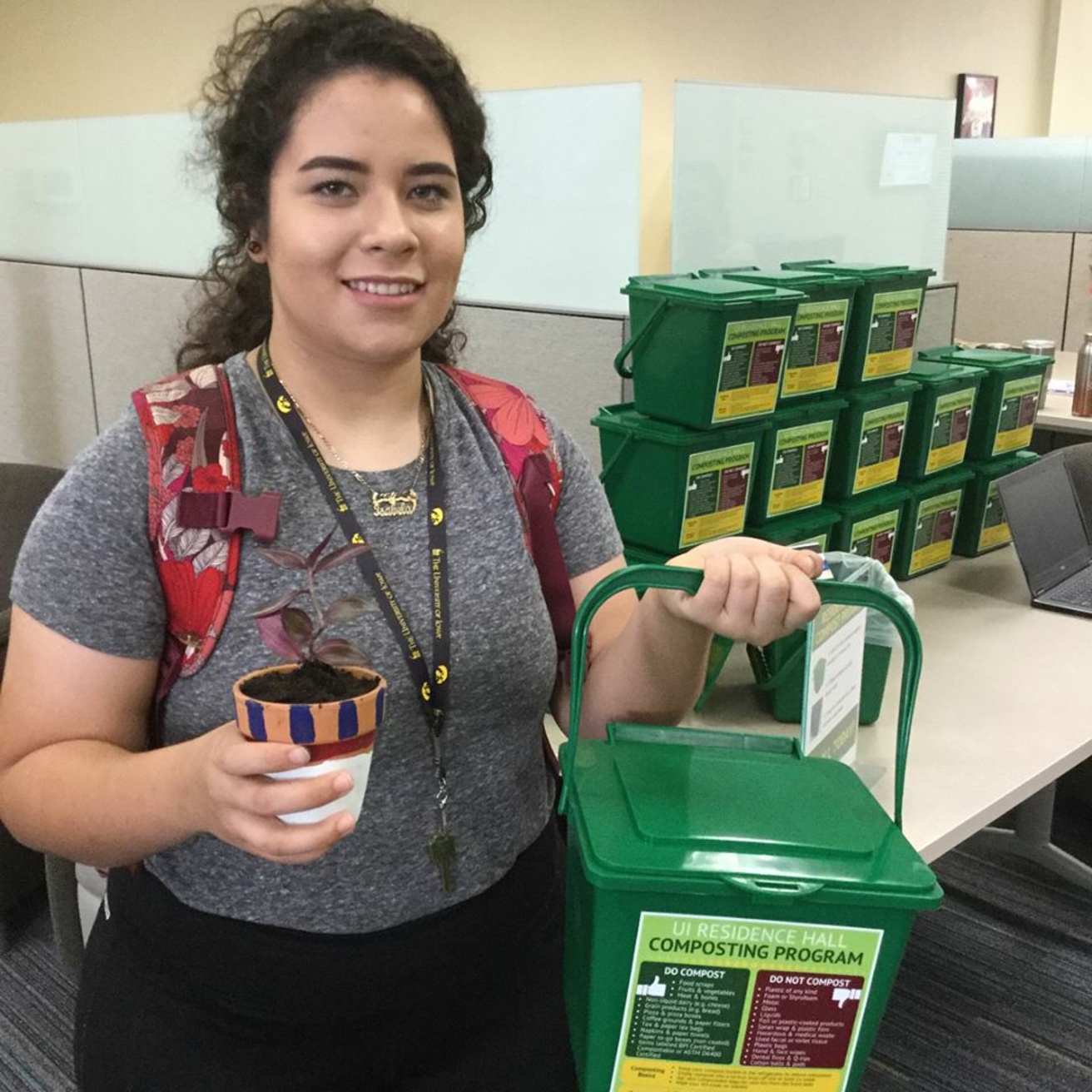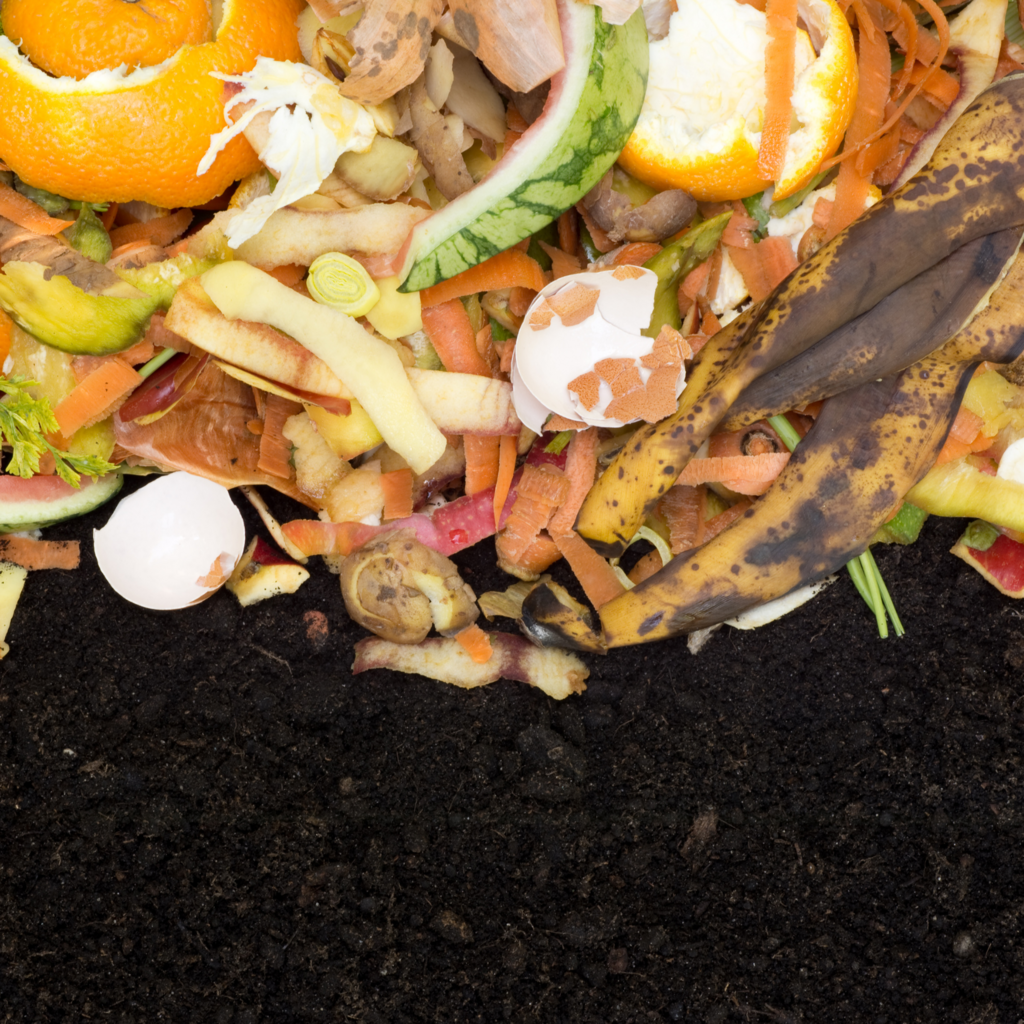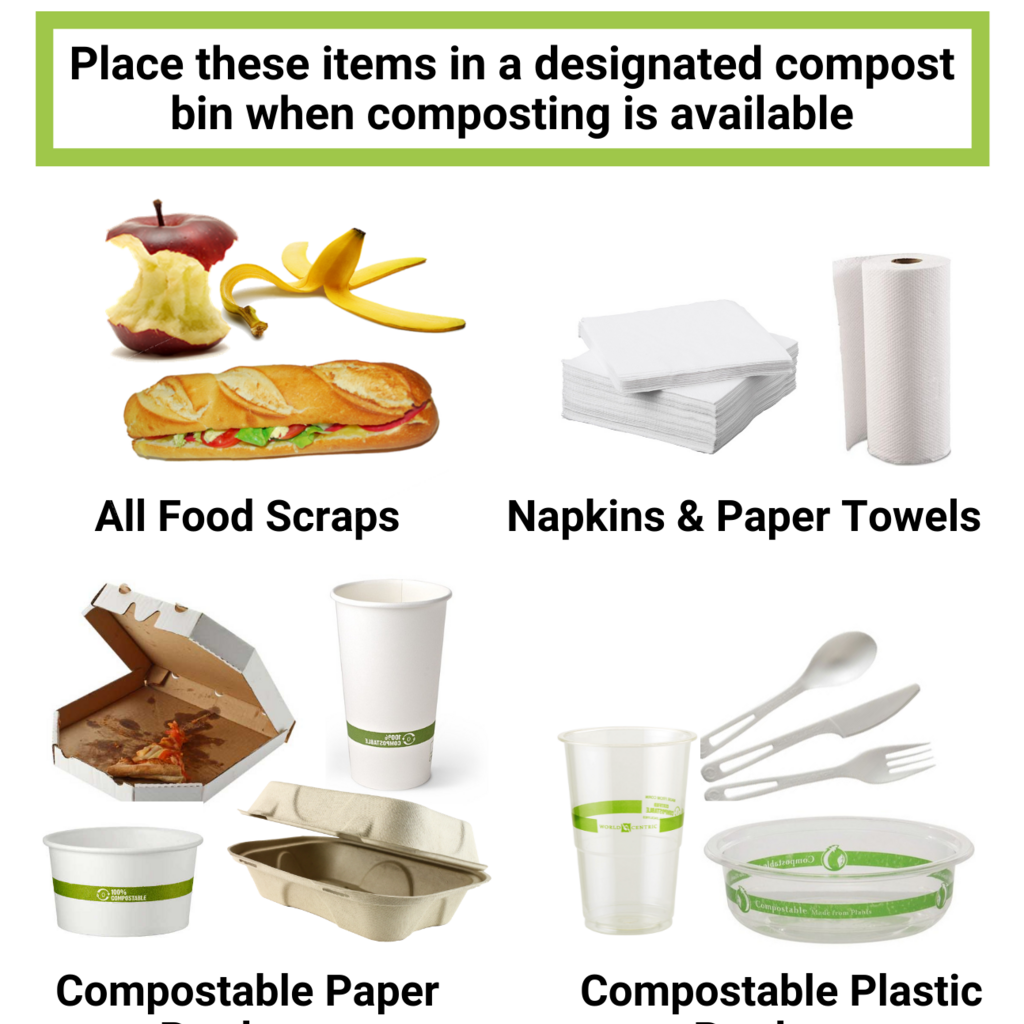Turning Waste Into Black Gold
The University of Iowa began composting in 2007, thanks to a group of undergraduate engineering students, the City of Iowa City, University Housing & Dining, Facilities Management, and many other partners. Since then, organics collection has expanded across campus and now diverts over 800,000 pounds of materials from the landfill each year.
How To Compost
Campus Dining Facilities
How to Compost in Dining Facilities
University dining facilities collect pre- and post-consumer food waste for composting.
- Pre-consumer: Dining staff at our campus dining facilities in Market Places, Iowa Memorial Union, and Iowa Health Care collect non-edible food waste during meal preparation. Items such as potato peels, eggshells, bones and more are collected for composting.
- Post-consumer: Dining halls that have return lines for reusable dishware collect food scraps left on the plate after diners are finished eating. Those food scraps are sent to the Iowa City Composting Facility.
- Learn how food pulpers make composting possible on campus.
Events
How to Compost at Events
Visit our Sustainable Events page to learn more.
Residence Halls
How to Compost in Residence Halls
Visit the Residence Hall Compost Program page for more information.
Offices and Breakrooms
How to Compost in Office Breakrooms
Step 1:
First, check with others who share your office space and your office manager to be sure that the compost bin will not be disruptive. If sharing the compost bin with other staff, check that all composters will use the bin correctly to prevent contamination.
Step 2:
Notify your Building Coordinator and your Custodial Supervisor of your desire to utilize compost services. This allows them to advise you of any policies/procedures that must be followed in your building. Note that UI Custodial Services does not provide compost collection, so you will need to develop a plan for emptying compost bins. Depending on the vendor, you may need to take your compost to a centralized location serviced by the vendor. Be sure to work with your Building Coordinator and Custodial Supervisor on placement of centralized bins serviced by the vendor.
Step 3:
Find a compost disposal option that best fits your needs.
Step 4:
If not supplied with a compost collection bin, find a bucket or container with a tight-fitting lid, and stock up on compostable bags. Be sure the bin is well labeled so users can identify it. Place signage of what can/can't be composted on or near the bin.
Step 5:
Place compostable materials in your bucket. To minimize odors and pests, consider keeping your bucket in the refrigerator.
Step 6:
If you run into problems, consult our FAQ section below.
Off-Campus
How to Compost Off-Campus
Step 1:
First, check with others who share your living space to be sure that the compost bin will not be disruptive. If sharing the compost bin with others, check that all composters will use the bin correctly to prevent contamination.
Step 2:
If you need a compost vendor, look into the various compost services in Iowa City. Find which service will best fit your needs.
Step 3:
If not supplied with a compost collection bin, find any simple trash can with a lid, and stock up on compostable bags.
Step 4:
Place compostable materials in your bucket. To minimize odors and pests, consider keeping your bucket in the refrigerator.
Composting FAQ
What is compost?
Compost is decayed organic material that is used as a soil amendment to improve plant growth. Compost-ing is the natural process of recycling organic material (e.g., food waste) into compost. The organic materials collected at UI are taken to the City of Iowa City's Compost Facility, where the composting process actually takes place. After twelve months of composting at their facility, the end result is finished compost.
Can I compost in my dorm room?
Yes! You can compost in all on-campus residence halls. Click here to learn more information about our residence hall compost program.
My bin smells, what should I do?
The food scraps in your compost bin should not smell any worse than if they were placed in a trash can. That being said, if a bin is not emptied often enough it will begin to smell. To get rid of odors, empty your bin and wipe out the inside of the bin to remove any food residue that has accumulated. If needed, wash the bin with soap and water (DO NOT rinse food down the drain. Wipe out food residue before washing.)
My bin has fruit flies or other pests, what should I do?
Fruit flies (and other pests) are attracted to rotting food, whether it's in the trash or the compost bin. The key is to empty the bin frequently. If fruit flies have already found your bin, empty the bin and clean it thoroughly. You may need to discontinue use of the bin temporarily until the fruit flies have dissipated. To trap the flies, pour apple cider vinegar into a small bowl or cup, then mix in a few drops of dish soap. The flies will land in the vinegar and then drown when they come into contact with the soap. Resume compost collection once the flies have disappeared. Then, be sure to empty your bin more often to prevent future pest problems.
Also, consider storing your compost bin in a refrigerator to slow decomposition and minimize pests. Or, try placing the compost bucket near a fan to keep the flies from the bucket.
Why doesn't my building have compost collection?
Compost collection is an optional service that buildings can choose to utilize. Some buildings choose not to participate for various reasons, including added cost to operations, lack of space at the dock for a collection container, concerns about compost becoming too contaminated, concerns about odors and pests, no one has requested compost collection, etc. If you live or work in a building that does not have compost collection and you would like to explore implementing a compost program, get step-by-step instructions on how to set up a program.
My compost is getting contaminated by others, what should I do?
The good news is that you are monitoring your compost well enough to know that you have a contamination problem. Be sure to remove any contamination you see before taking it to a drop-off site or having it picked up. Now that you know you have a problem, you'll need to do some outreach and education. Identify the contaminants. Is it always the same contaminants? If so, you might be able to place a note on the compost bin letting people know that specific item is NOT compostable. If you're seeing lots of different kinds of contamination, you'll need to do more broad education. Maybe you can email a copy of the "What To Compost" flyer to everyone potentially using the compost bin(s). More than likely, whoever is contaminating the compost is not doing it on purpose and they just need to know what's acceptable and what's not.
I'm going to compost at my upcoming event, do I need volunteers at compost bins?
YES! Any event that is collecting compostables should have someone staffing each compost bin at all times. This is the only way to ensure that the bins do not get contaminated. Learn more about composting at events.



